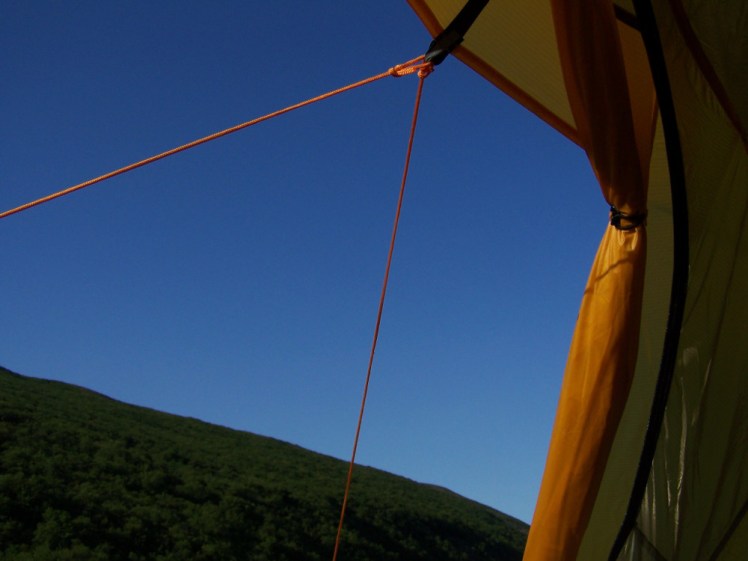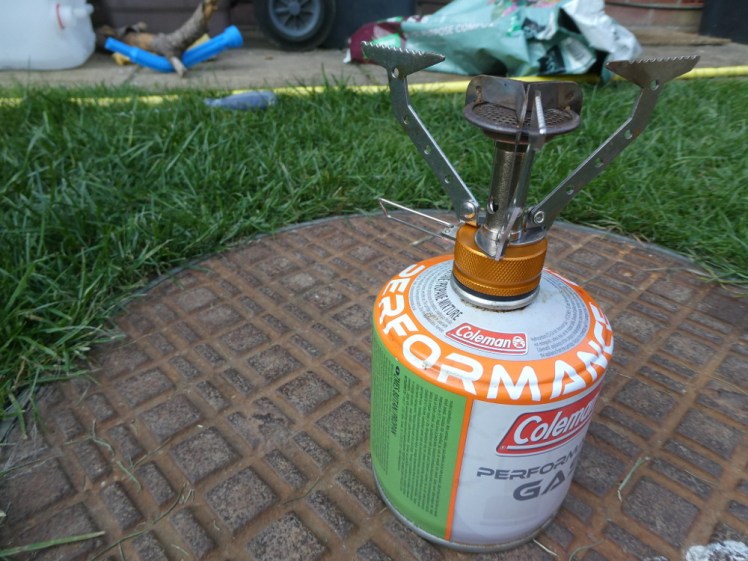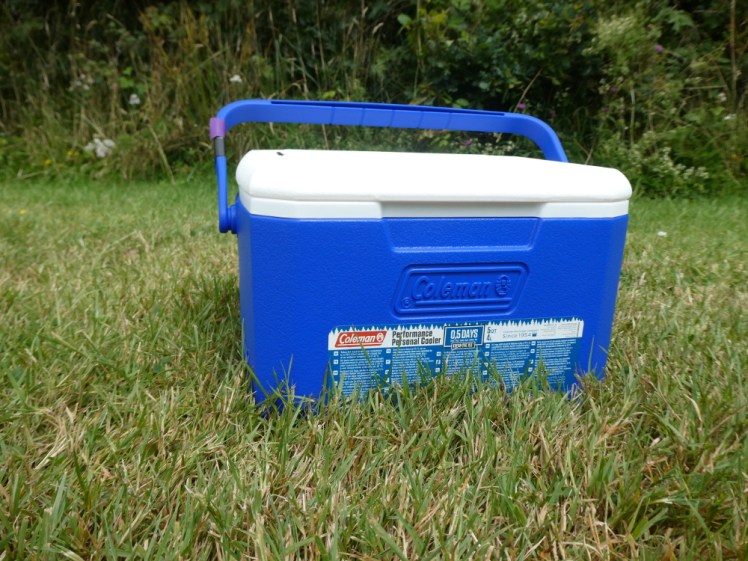As I may have mentioned in my last post, I went camping in the heatwave and made some errors in judgement. But those errors were caused, in part, by the lack of any information whatsoever about how to camp in hot weather. People talk a lot about how to camp in the cold – I’ve done it myself – but it doesn’t seem to occur to people that there are questions and issues regarding heat and so I’m going to try to write that post now.
You still need a warm bed

My big mistake was to think that because it was hot and I was in a comfortable tree tent that I didn’t need a mat or a warm sleeping bag. Not true! Whether you’re in a tree tent or an ordinary boring one on the ground, you need insulation. The ground, whatever the weather, gets cold overnight. Having nothing but air underneath you is cold. Sure, you probably don’t want your enormous four-season sleeping bag but I personally wouldn’t go down any lower than two-season and as I tend to camp with my car, I’d chuck in a second bag that can roll around in my tent and be unpacked at midnight if I want it. Definitely take a good sleeping mat, too. I’m not personally a fan of camp beds or airbeds and having slept in a tree tent, I’ve decided I’m definitely not on the side of having cold air underneath me. I’d far rather have the ground.
You still need lots of food

When I was kayaking, we were talking about group leadership and what to tell your group to bring in different weather. You instinctively bring lots of extra food when it’s cold because you know you need the extra fuel to keep yourself warm. You instinctively bring extra water when it’s hot (you do, right?) because you know you need to keep hydrated when you’re sweating. But it’s so easy to think you can live off ice cream and salad leaves in hot weather and it’s not true. You need just as much solid food in summer as in winter. Personally, I don’t tend to bother with hot chocolate on summer camps but your fuel reserves will still appreciate a big bowl of pasta in the evening even in a heatwave.
You need lots of water

I’ve just said that you instinctively bring lots of extra water. Make sure that you do. If it’s a bit of a trek to the nearest drinking water tap, make sure you have a water carrier so you’ve always got water close at hand because if you have to walk any distance at all every time you want to refill your mug, you’re not going to do it as often as you should.
Tents get really hot in the morning

After I insisted that you need warm bedding, you’re probably going to wake up early because it’s too hot. Tents are made of plastic and that means effectively you’re sleeping in your own private greenhouse. The moment the sun pokes its head over the horizon it’ll start to heat up and by the time it’s hauled itself into the sky, you’ll probably be sweltering. Sometimes I open my tent doors to let a breeze in and obstinately stay in bed another hour or three. Sometimes I realise I’m going to be fit only for dumping on a plate stewed in my own juices in a few minutes and I have to get up earlier than I’d like. But either way, take into account that your tent is going to get really hot and probably earlier than you expect.
You need to pack sun protection
[I don’t have any photos of me sunburnt!]
You think of camping, you think of waterproofs. You think of being perpetually damp and miserable. But hot weather does exist and if you find yourself camping in it, you’ll need to pack sun protection. Bring your sun cream, bring your big shady hat, bring your sunglasses. I know, sun cream and tents don’t go together. But we had a Guide camp several years ago now where one of the leaders got ill from the heat and had to go home. I had sunstroke when I was tiny (or at least, that’s what my mum called it. No idea if that’s correct or accurate now) and it’s not something you want to enjoy in a tent. Don’t get too hot, don’t get sunburnt.
Mind your gas canisters

I’m always wary of my gas canisters in hot weather. I daresay it has to get a lot hotter before they start exploding but all the same, I don’t leave them in my car on hot days and I try not to leave them in my tent on hot days. Sometimes I’ll find somewhere shady around the tent. Very occasionally I’ll find somewhere indoors – the campsite on Dartmoor I’ve just got back from has private bathrooms, or private compartments within the toilet block, and that’s the coolest place on site so I might leave it in there on really hot days. If you can’t find somewhere cool, try to at least get them out of the sun and perhaps insulated.
You have to think about food storage

In cold weather it’s very easy to just pack a coolbox. In summer, that coolbox will be as hot as an ordinary box within about twenty-four hours. How do you keep your food cool and safe? My old Guide handbook has lots of suggestions – a bucket with a wet tea towel over the top, a hanging larder in the shade of a tree, a patrol store box which looks like a rabbit hutch. In Anne of Green Gables, the little girls keep their milk bottles in the stream outside while they’re in school. Some campsites provide communal fridges and freezers for the campers’ use. Sometimes they provide freezers for re-freezing your own ice packs. On Guide camp, we freeze all the milk and use that as ice packs – it keeps the milk cool for longer, it keeps the food cool for a while and as it thaws, you can pour it into your tea or cereal. Sometimes it’s better to not take anything that needs to be kept cool, or to use it for your first meal and then live off dry packets and tins for the rest of the trip. Or make regular visits to a local supermarket so your cool stuff is always new and fresh. Or go and enjoy local pubs and restaurants. Whatever option you eventually go for, just bear in mind that you have to think more about your food storage in hot weather.
Beware of bugs
[I’ll spare you the photo of my splotchy bug-eaten legs and delightful broken veins]
I’m no entomologist but I know that you get more bugs out and biting in hot weather than in cold. Bring bug spray to keep them away and AfterBite for afterwards. Try not to scratch before applying it, otherwise it stings like the devil himself. I don’t know anything about the effectiveness of citronella candles but I’ve heard a lot about them – just don’t light them in or close to your tent. Tents are incredibly flammable and while a tent fire will keep bugs away for a while, you’re going to get cold once the flames die down and you’ve got nothing to sleep in. Also, beware of ticks. Very nasty little things. If you haven’t encountered them, they live in long vegetation and will leap onto anything passing by. Once they latch on, they can pass on tick-borne encephalitis (although I think that’s less common in the UK) and Lyme disease, which is very unpleasant and very long-lasting. Long legs and sleeves will offer some protection – not 100% protection but some. Take a tick remover (don’t pull them off with your bare hands and don’t squeeze them with tweezers, you’ll make the danger so much worse) and try to stay out of long grass. Look out for the famous “bulls eye” rash and get straight to the doctor. Likewise if you start having flu-like symptoms, especially as people will automatically assume it’s Covid at the moment. Get tested for that and then get to the doctor and tell them you might have had a tick. If you’re a dog owner, you’ll probably be familiar with ticks – they do like to attach themselves to your furry friends but I get the impression dogs are not so prone to Lyme disease.
And so, you see, camping might seem easier in warm weather and it is nice when the tent isn’t dripping and you’re not permanently damp but there are still things to think about. Hopefully this will help you with a few of them.